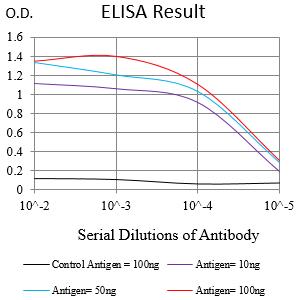
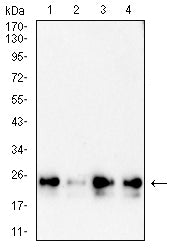
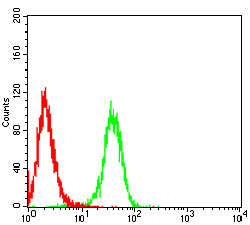
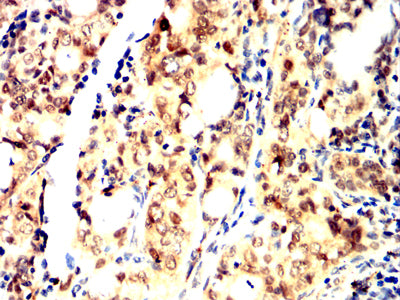
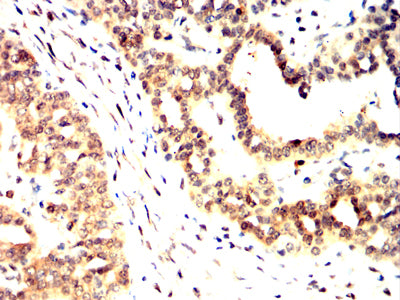
| WB | 1/500 - 1/2000 | Human,Mouse,Rat |
| IF | 咨询技术 | Human,Mouse,Rat |
| IHC | 1/200 - 1/1000 | Human,Mouse,Rat |
| ICC | 技术咨询 | Human,Mouse,Rat |
| FCM | 1/200 - 1/400 | Human,Mouse,Rat |
| Elisa | 1/10000 | Human,Mouse,Rat |
| Aliases | DJ1; DJ-1; GATD2; HEL-S-67p |
| Entrez GeneID | 11315 |
| clone | 2B1D7 |
| WB Predicted band size | 19.8kDa |
| Host/Isotype | Mouse IgG1 |
| Antibody Type | Primary antibody |
| Storage | Store at 4°C short term. Aliquot and store at -20°C long term. Avoid freeze/thaw cycles. |
| Species Reactivity | Human |
| Immunogen | Purified recombinant fragment of human PARK7 (AA: 1-189) expressed in E. Coli. |
| Formulation | Purified antibody in PBS with 0.05% sodium azide |
+ +
以下是3篇关于PARK7(DJ-1)抗体的代表性文献概览:
---
1. **文献名称**: *"The expression of DJ-1 (PARK7) in normal human CNS and idiopathic Parkinson's disease"*
**作者**: Bandopadhyay R, et al.
**摘要**: 该研究通过开发特异性PARK7抗体,揭示了DJ-1蛋白在人类中枢神经系统的广泛表达,并发现其在帕金森病患者黑质神经元中的表达显著降低,提示其与帕金森病病理机制相关。
---
2. **文献名称**: *"DJ-1 as a biomarker for Parkinson's disease in cerebrospinal fluid and blood"*
**作者**: Shadrach JL, et al.
**摘要**: 研究利用高特异性PARK7单克隆抗体,通过ELISA和免疫印迹法检测帕金森病患者脑脊液及血液中的DJ-1水平,探讨其作为疾病生物标志物的潜力,发现其与疾病进展的相关性。
---
3. **文献名称**: *"Anti-oxidative and anti-apoptotic effects of DJ-1 in Parkinson's disease models"*
**作者**: Takahashi-Niki K, et al.
**摘要**: 通过免疫组化和免疫沉淀技术结合PARK7抗体,研究发现DJ-1通过清除活性氧(ROS)保护神经元,并证实其缺失导致线粒体功能障碍,为抗氧化治疗提供依据。
---
4. **文献名称**: *"PARK7 interacts with p53 and regulates its function"*
**作者**: Macedo MG, et al.
**摘要**: 使用PARK7抗体进行免疫共沉淀和蛋白质互作分析,发现DJ-1与肿瘤抑制蛋白p53直接结合,调控其稳定性及转录活性,揭示其在神经退行性疾病与癌症中的双重作用。
---
以上文献均聚焦于PARK7抗体的实验应用,涵盖疾病机制、生物标志物开发及分子功能研究。如需具体DOI或年份信息可进一步补充。
**Background of PARK7 Antibody**
The PARK7 antibody is a crucial tool for studying the PARK7 protein, also known as DJ-1. encoded by the *PARK7* gene. This gene is linked to autosomal recessive early-onset Parkinson’s disease (PD), with mutations causing loss of function associated with neurodegeneration. PARK7 is a multifunctional protein involved in oxidative stress response, mitochondrial regulation, and cellular survival. It acts as a redox-sensitive chaperone, protease, and transcriptional regulator, playing roles in antioxidant defense, dopamine homeostasis, and neuroprotection.
PARK7 antibodies are widely used in research to detect and quantify PARK7 expression in tissues, cell lines, or biological fluids. They enable investigations into its subcellular localization (e.g., cytoplasm, mitochondria, nucleus), expression changes under stress conditions, and interactions with other proteins. Applications include Western blotting, immunohistochemistry, immunofluorescence, and ELISA. These antibodies are pivotal in PD models, helping elucidate PARK7’s role in disease mechanisms, such as mitochondrial dysfunction or α-synuclein aggregation.
Specificity is critical, as PARK7 has isoforms and post-translational modifications. Validated antibodies distinguish between wild-type and mutant forms, aiding functional studies. Cross-reactivity with homologs in model organisms (e.g., mice, zebrafish) also supports translational research. Challenges include ensuring minimal cross-reactivity with unrelated proteins and confirming target engagement through knockout controls. Overall, PARK7 antibodies are indispensable for exploring its contributions to neurodegeneration and potential therapeutic strategies.
×